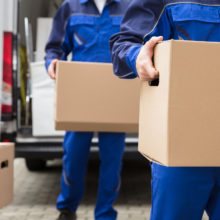
Moving out of state can be a daunting task, but with the right approach, it can also be an exciting and successful transition. This blog post will provide tips on how to research your new home state, organize your move efficiently, prepare for the big day and adjust to your new surroundings seamlessly. Whether you’re moving locally or long-distance, this guide will help ensure that you have a smooth and stress-free experience.
Researching Your New Home State
Researching your new home state is a crucial step when moving out of state. It helps you understand the cost of living, housing market, climate and weather conditions, job market and other important factors that affect your daily life. The first step is to determine your budget for the move and research the cost of living in different areas within the state. This will help you identify affordable neighborhoods or cities that fit within your budget.
Researching your new home state before moving can help you make informed decisions about affordable neighborhoods, suitable housing options, and job opportunities for a smooth transition.
Additionally, researching the housing market can help you find suitable options for packing up and relocating to a new address with ease. You can also get an idea of what type of homes are available in various price ranges before making any final decisions on where to live in your new home state. Moreover, examining job opportunities is essential as it affects not only financial stability but also overall satisfaction after moving out of state. By exploring these topics beforehand, individuals can make informed decisions about their future relocation and ensure a smooth transition into their new environment.
Cost of Living
Comparison of cost of living index between current and new state is an important factor to consider when moving. Factors contributing to the cost of living such as housing, taxes, healthcare can vary greatly from state to state. To budget and save money during the move, it’s crucial for individuals to do thorough research before making any decisions.
Here are some tips for budgeting and saving money during a move:
- Consider downsizing or selling unwanted items before packing
- Look into affordable housing options in desired areas
- Research local tax rates and compare with current residence
- Check if employer offers relocation packages or assistance with job search in new area
With proper planning and research, individuals can minimize the cost of living impact when moving out of state.
Housing Market
Researching real estate market trends in your new state is essential to securing a good buy or rental within your budget. Before making any decisions, it’s important to factor in the pros and cons of renting vs buying based on current housing market conditions. Additionally, when choosing a neighborhood, be sure to consider proximity to work or schools as this can greatly impact daily life.
Here are some key points to keep in mind:
- Research real estate market trends before making any decisions
- Consider factors such as rental vs buying options and proximity to work/schools
- Don’t forget about the cost and budget implications of each option
Climate and Weather
Seasonal weather patterns and extremes in the new state can greatly impact outdoor activities like hiking or skiing in different seasons. It’s important to research and plan accordingly for any climate changes that may affect your hobbies or lifestyle choices. Additionally, finding resources for emergency preparedness specific to climate-related events is crucial for staying safe and secure during extreme weather conditions.
Here are some tips to consider when it comes to
- Research seasonal weather patterns before moving
- Invest in appropriate gear for outdoor activities throughout the year
- Have a plan in place for emergency situations such as floods, hurricanes, or snowstorms
- Keep up-to-date on local news regarding potential natural disasters
Remember that being aware of the climate and weather changes will not only keep you safe but also allow you to enjoy all that your new state has to offer!
Job Market
If you’re planning to relocate, it’s important to research in-demand industries and job types within the area. This will give you an idea of the job market and what opportunities are available for you. Additionally, if you already have a job offer and are relocating with your current company, do some thorough company research to ensure that the relocation is worth it financially.
In addition to traditional employment channels, there are also gig economy jobs and part-time opportunities available outside of regular 9-5 jobs. These can be great options for those on a tight budget or who need flexibility in their work schedule while settling into a new address. Keep an open mind when exploring these alternative job options as they could lead to unexpected career paths!
Organizing Your Move
To ensure a smooth and successful transition when moving out of state, organizing your move is essential. Start by creating a detailed checklist that outlines all the tasks you need to complete before the big day. This should include hiring a reputable and reliable moving company, packing and labeling your belongings properly, donating or selling unwanted items, canceling utilities at your old home, transferring or setting up new services at your new home, notifying important contacts of your change of address, and updating necessary documents such as driver’s licenses and insurance policies.
When it comes to hiring a moving company for an out-of-state move, look for one that offers efficient transport services at a guaranteed price. Make sure to read reviews from previous customers to ensure their reliability and security in transporting your possessions. Additionally, consider purchasing additional insurance coverage for added protection during transit. With careful planning and organization of these key factors in advance of moving day you can make sure everything runs smoothly with minimal stress on yourself!
Hiring a Moving Company
Research and compare quotes from multiple companies to ensure that you get the best deal when hiring a moving company. Make sure that the quote is comprehensive and includes all services that you require. Don’t forget to ask about any hidden fees or additional charges.
Check for licenses and insurance before deciding on a moving company. This will help protect your belongings in case of damage or loss during transport. Also, it’s important to read reviews and ask for referrals from friends or family who have used similar services in the past. Doing so can help ensure efficiency, reliability, and security during your move out of state.
Packing and Labeling
Create a Packing Plan and Timeline to Stay Organized
Moving out of state can be stressful, but creating a packing plan and timeline can make the process more manageable. Start by assessing all your belongings and determining what you want to take with you. From there, create a timeline that allows enough time for each room in your home, making sure to prioritize essential items first.
Label Boxes with Contents, Room, and Fragility Level for Efficient Unpacking
Efficient unpacking is just as important as efficient packing. Label boxes with their contents along with the room they belong in to help movers place them properly upon arrival. Also include fragility level labels on boxes containing breakable items or electronics so that movers know how carefully they need to be handled.
Pack Essential Items Separately for Easy Access Upon Arrival
It’s easy to get carried away when packing everything up; however it’s important not forget about essential items such as toiletries or medication! Pack these items separately from the rest of your belongings so they are easily accessible upon arrival at your new residence.
Donating or Selling Unwanted Items
Sort Through Belongings in Advance: Before moving out of state, it’s important to sort through your belongings and decide which ones you want to keep or get rid of. This will make the packing process easier and save you time and money on transportation costs.
Donate to Local Charities or Sell Online: Once you’ve decided what items you no longer need, consider donating them to local charities or selling them online. Not only will this help someone else in need, but it’ll also lighten your load for the move. Selling items online can also provide extra cash for unexpected expenses during the transition.
Dispose of Hazardous Materials Properly: It’s crucial to dispose of hazardous materials properly before moving out of state. Examples include old paint cans, cleaning supplies, batteries, and electronics. Contact your local government for information on how to safely dispose of these materials so they don’t harm people or the environment during transport.
Preparing for the Big Move
The key to a successful move out of state is preparation. Start by updating your address with all relevant parties, including the post office, banks, and credit card companies. Make sure everyone knows where to find you after the move so that you don’t miss any important mail or payments.
Next up is changing your driver’s license and car registration. Check with your new state’s Department of Motor Vehicles (DMV) for specific requirements and necessary documentation. Don’t forget to transfer insurance coverage as well.
Transferring utilities should also be on your list of things to do before the big move. Contact each provider individually to schedule disconnection at your old home and activation at the new one.
Finally, finding new healthcare providers can be challenging but essential if you have chronic health issues or need regular check-ups. Research doctors in your area beforehand so that you can quickly transition into their care upon arrival in your new location.
Updating Your Address
Notify USPS of your new address as soon as possible to avoid missing any important mail. It’s also important to update your address on all your accounts including banks, credit cards, and subscriptions to ensure you receive all important information at the correct location. Don’t forget to notify family and friends of your new address so they can stay in touch with you. Keeping these key areas up-to-date will make for a smoother transition during this exciting time of moving out of state.
Changing Your Driver’s License and Car Registration
To ensure a smooth and successful transition when moving out of state, it’s important to take care of updating your driver’s license and car registration as soon as possible. Visit the local DMV to update your driver’s license with your new address and switch over your car registration to the new state’s Department of Motor Vehicles. Don’t forget to also get car insurance that meets the requirements for the new state.
Failing to complete these steps in a timely manner can result in costly fines or legal issues down the line. Taking care of them early on will give you peace of mind and help you settle into your new home more smoothly.
Transferring Your Utilities
Contact your current utility providers to ensure that services are ended on moving day. Call ahead of time so that you can schedule a final meter reading and settle any outstanding balances before vacating the property. Be sure to provide your new address for any remaining bills or refunds.
Research and set up utilities in advance at your new home, including electricity, water, and gas – don’t leave it until the last minute! Check with local service providers for pricing information to get a better idea of what to expect when budgeting for this expense.
Scheduling installation appointments for internet/cable services in advance will help minimize downtime after you move in. This way you won’t have to wait around without access while cable technicians install equipment – just make sure they know exactly where things need to be installed when they arrive!
- Contact current utility providers
- Research and set up utilities at the new home
- Schedule installation appointments beforehand
Finding New Doctors and Healthcare Providers
Research healthcare providers within your network coverage area to ensure that you have access to quality care. Gather medical records from your current physicians before moving to a new provider or location. This will help the new doctor understand your health history and provide more personalized care. Once settled in, schedule appointments with a primary care physician and specialists as needed, ensuring that you feel comfortable with their approach and expertise in managing any ongoing conditions or concerns. By being proactive in finding new doctors and healthcare providers, you can have peace of mind knowing that your health needs are being met even during a big transition like moving out of state.
Adjusting to Your New Home State
Adjusting to your new home state can be a challenging process, but with the right mindset and approach, it can also be an exciting one. One of the first things you should do is get to know your new community and surroundings. Take some time to explore nearby neighborhoods, parks, restaurants and shops.
Another essential part of adjusting is making connections with people in your new area. Seek out local groups or organizations that match your interests or hobbies. This will not only help you meet like-minded individuals but can also provide a sense of familiarity and belonging in an unfamiliar place. Remember that building relationships takes time, so don’t be discouraged if it doesn’t happen overnight – keep putting yourself out there!
Meeting New People and Making Friends
Joining a local gym or fitness class, volunteering for community events, and attending networking events are great ways to meet new people and make friends when moving out of state. By joining a gym or fitness class, you’ll have the opportunity to connect with like-minded individuals who share similar interests in health and wellness. Volunteering for community events is also an effective way to meet new people while giving back to your new community.
In addition, attending networking events can open doors for professional relationships as well as social connections. Whether it’s connecting with fellow professionals in your industry or simply meeting locals who share similar hobbies and interests, networking events provide opportunities for meaningful interactions that can lead to long-lasting friendships. Don’t be afraid to step outside of your comfort zone and attend these types of gatherings – they may just be the key to building a fulfilling social life in your new home!

Exploring Your New Area
If you’re moving out of state, one of the most exciting parts is exploring your new area. Visiting tourist attractions is a great way to get to know your new city or town and learn about its culture and history. Taking walks in the neighborhood can also be an enjoyable way to discover hidden gems like local shops, parks, and cafes. Trying out new restaurants and cafes can be a fun adventure for foodies who want to taste local cuisine.
As you settle into your new home, take some time to explore what’s around you. You never know what kind of interesting places you might find just around the corner!
Joining Local Groups and Organizations
Participating in hobby groups or clubs, attending religious services or joining a congregation, and getting involved with non-profit organizations are all great ways to join local groups and organizations when moving out of state. These activities provide opportunities to meet new people who share similar interests and values, creating the potential for long-lasting friendships.
Hobby groups and clubs offer a chance to pursue personal interests while meeting like-minded individuals. Joining a religious congregation provides not only spiritual fulfillment but also an opportunity for community involvement. Non-profit organizations allow you to give back to your community while making connections with others dedicated to making a difference.
Taking the initiative to get involved in local groups and organizations can help ease the transition of moving out of state by providing social support systems as well as meaningful activities that can make your new location feel more like home.





